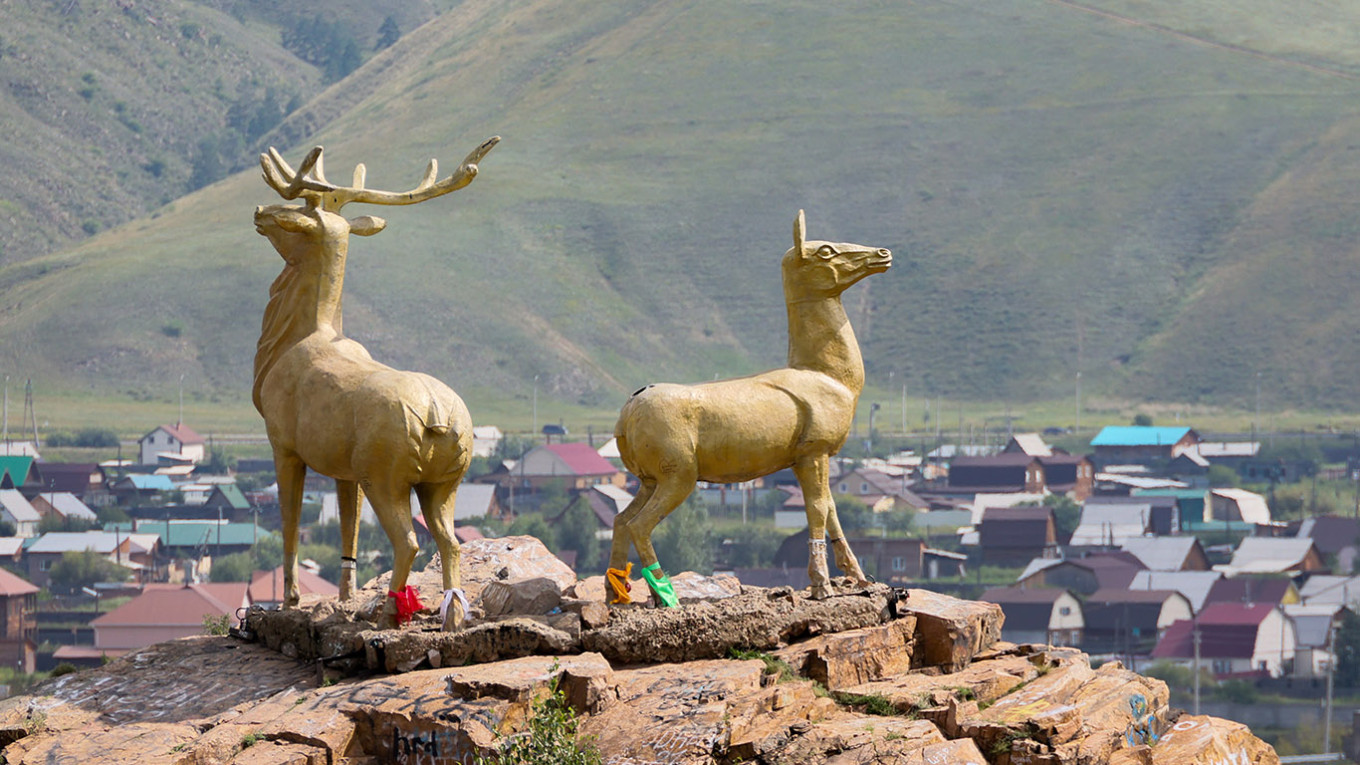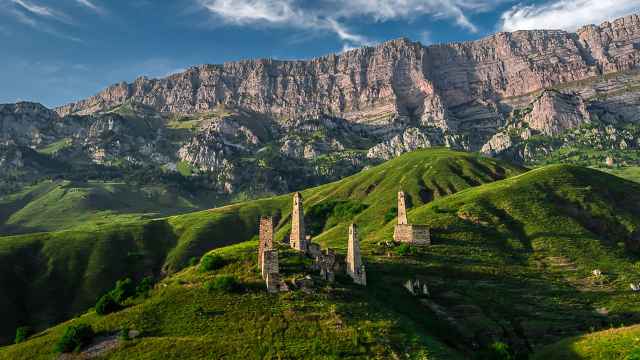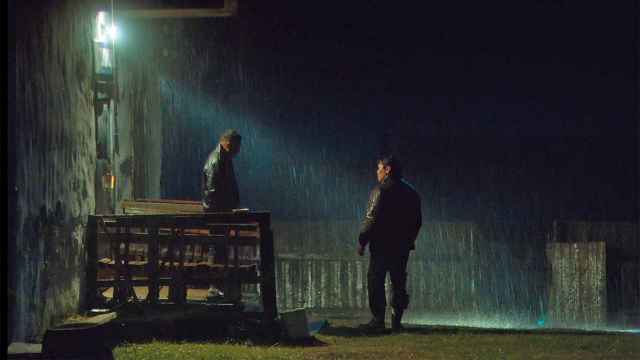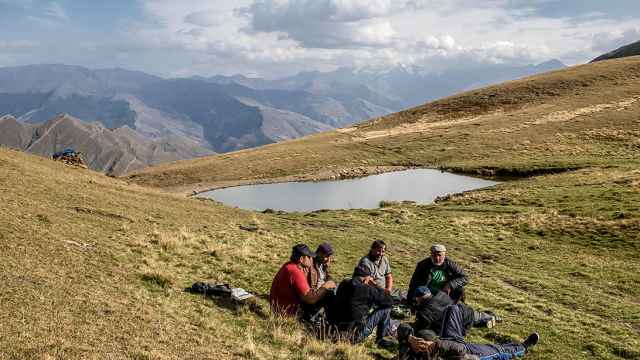In 2024, Russia’s ethnic republics witnessed some of the country’s largest protests, suffered from the disproportionate mobilization of its Indigenous inhabitants for the front lines in Ukraine, and experienced the first ripple effects of Moscow’s war.
In anticipation of a no less eventful 2025, The Moscow Times asked leading activists and experts on politics and society in Russia’s republics to share their predictions and advice on trends to watch in the coming year.
These interviews have been edited for length and clarity.
Maria Vyushkova, Buryat activist and researcher
A famous Russian superstition states, ‘Just as you welcome in the New Year, so you will spend it.’
In Buryatia, a New Year’s tree on the central square of the capital Ulan-Ude fell a few days after it was installed — this is very symbolic.
All of Buryatia’s money is spent on the war in Ukraine, which means less and less is allocated to the day-to-day needs of the region. This has already led to an array of problems with municipal services and the utilities sector — and this will only get worse.
In 2024 Russian lawmakers passed the law allowing clearcut logging around Lake Baikal and I think we will already start to witness the harmful effects of it in 2025. This law provides ample room for abusing the environment.
We will also see further tightening of screws in the political field in Buryatia. Authorities already opened new cases against human rights lawyer Nadezhda Nizovkina and activist Alexey Popov. Both are accused of ‘discrediting the Russian army’ and are among only a few activists remaining in the republic.
Ruslan Aysin, Tatar political analyst and journalist
Putin’s system will experience a serious crisis in 2025 and ethnic republics — especially those in the Caucasus and the Volga-Ural region — will be the first to protest and express their dissatisfaction. We can already see some seeds of this.
Such was the recent statement made by Chechnya’s head Ramzan Kadyrov who slammed Russia’s Investigative Committee head Alexander Bastrykin and Interior Minister Vladimir Kolokoltsev [for fueling anti-immigrant sentiment]. This move was not in line with the corporate ethics of Putin’s regime.
Tatarstan’s head Rustam Minnikhanov also came out with harsh criticism of the new bill on local self-governance, which would practically dismantle that political institution. Minnikhanov said that this law would kill the village…and widen the gap between the government and the people.
I am more than sure that these examples are just the beginning [of regional resistance]. The more serious the political crisis, the louder will be the voices of the regions suffering from it the most.
Sargylana Kondakova, co-founder of Indigenous rights group Free Yakutia Foundation
I expect the overall standard of living in the republic of Sakha (Yakutia) to worsen further.
Inflation will have a pronounced impact on residents of Yakutia because the region is ranked among those with the highest poverty rates. The republic’s Arctic districts, which consistently experience problems with food supply, will be especially affected.
There are also signs of increased centralization of power in the region, including the scrapping of direct elections of the Yakutsk mayor and — possibly — elections of municipal administration heads.
A new wave of [military] mobilization is also still possible.
In January, the digital military draft system could be launched. Ignoring a summons received electronically is punishable by law and people are very worried about this change. Many are already preparing to leave the republic. I believe the outflow of young, educated Yakutians will continue in 2025.
Harold Chambers, an analyst focusing on nationalism, conflict and security in the North Caucasus
In the coming year, the North Caucasus will likely face continued upheaval.
The war effort has led to widespread raids [in search of new conscripts] in Chechnya, Dagestan and Ingushetia. This forced conscription will not stop — absent large-scale public protest — as Russia’s manpower problems continue.
The expansion of Ukrainian drone attacks beyond the western republics is another trend that will continue, bringing the war home in a new way for Chechnya and Dagestan.
The other major front for instability is militant activity. The threat of further Islamic State attacks remains. Relatedly, prison breaks will still be a trend to watch.
There are also a couple of Chechnya-specific dynamics to watch next year.
First, integration of Kadyrov’s children into the regime will progress as they receive more awards, higher posts and more foreign liaising. … While there should be no cooptations through marriage in the coming year, subordinate government appointments and business deals will continue the children’s cooptation of other influential families [in Chechnya].
Second, more public acts of opposition to the Kadyrov regime should be expected, continuing the trend from 2024.
Isabella Evloeva, Ingush journalist and founder of independent news outlet Fortanga
The issue of militant activity remains critical for Ingushetia. Armed clashes in the spring of 2023 served as a troubling reminder of [persistent] regional instability.
The second pressing issue is territorial disputes.
Recent news about the possible handover of parts of Ingushetia’s Erzi Nature Reserve to Chechnya has reignited tensions…If the handover is pursued, it could agitate Ingush civil society.
If the war in Ukraine ends in 2025, Chechnya’s head Ramzan Kadyrov might refocus his attention and resources on Ingushetia.
Kadyrov previously made provocative statements about the Ingush, questioning their national identity and territorial rights; these comments became less frequent amid the war. Ingushetia for Kadyrov is analogous to Ukraine for Putin. Relations between Ingushetia and Chechnya resemble those between pre-war Russia and Ukraine.
Chechnya’s annexation of parts of Ingushetia in 2018 remains a painful issue. Should external factors allow Kadyrov to concentrate on the region again, the situation could escalate.
Economically, Ingushetia’s 2025 budget has a deficit of nearly 400 million rubles ($3.8 million). Combined with existing problems — high unemployment, slow economic development and corruption — this deficit may heighten social discontent.
A Message from The Moscow Times:
Dear readers,
We are facing unprecedented challenges. Russia's Prosecutor General's Office has designated The Moscow Times as an "undesirable" organization, criminalizing our work and putting our staff at risk of prosecution. This follows our earlier unjust labeling as a "foreign agent."
These actions are direct attempts to silence independent journalism in Russia. The authorities claim our work "discredits the decisions of the Russian leadership." We see things differently: we strive to provide accurate, unbiased reporting on Russia.
We, the journalists of The Moscow Times, refuse to be silenced. But to continue our work, we need your help.
Your support, no matter how small, makes a world of difference. If you can, please support us monthly starting from just $2. It's quick to set up, and every contribution makes a significant impact.
By supporting The Moscow Times, you're defending open, independent journalism in the face of repression. Thank you for standing with us.
Remind me later.







